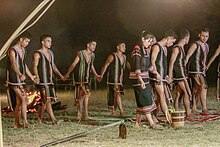 Jarai people in traditional costume | |
| Regions with significant populations | |
|---|---|
| 513,930 (2019)[1] | |
| 26,922 (2019)[2] | |
| Languages | |
| Jarai;[3] Vietnamese and Khmer as second language in Vietnam and Cambodia respectively | |
| Religion | |
| Animism, Evangelicalism, Buddhism[4] | |
| Related ethnic groups | |
| Cham, Ede, Acehnese, Filipino | |
Jarai people or Dega (Vietnamese: Người Gia Rai, Gia Rai, or Gia-rai; Khmer: ចារ៉ាយ, Charay or Khmer: ជ្រាយ, Chreay) are an Austronesian indigenous people and ethnic group native to Vietnam's Central Highlands (Gia Lai and Kon Tum Provinces, with smaller populations in Đắk Lắk Province), as well as in the Cambodian northeast Province of Ratanakiri. During the Vietnam War, many Jarai persons, as well as members of other Montagnard groups (Khmer Loeu and Degar), collaborated with US Special Forces, and many were resettled with their families in the United States, particularly in North Carolina, after the war.
The Jarai language is a member of the Malayo-Polynesian branch of the Austronesian language family. It is related to the Cham language of central Vietnam and Cambodia and the Malayo-Polynesian languages of Indonesia, Malaysia, Madagascar, Philippines and other Pacific Islands such as Hawaii and New Zealand. There are approximately 332,558 Jarai speakers. They are the largest of the upland ethnic groups of the Central Highlands known as Degar or Montagnards and they make up 23% of the population of Ratanakiri Province in Cambodia. Both groups, the Cambodian and Vietnamese Jarai, share the same traditions and keep a close relation of cultural interchange, but their language gets the influence of their respectively Khmer and Vietnamese linguistic environment. A few of khmer Jarai words are borrowed from Khmer and Lao. While trading conversation between Khmer Jarai and Vietnamese Jarai, there can be some perplexity among them. Vietnamese Jarai has a written form in Latin script, but Khmer Jarai does not.
- ^ "Report on Results of the 2019 Census". General Statistics Office of Vietnam. Retrieved 1 May 2020.
- ^ "Ethnic Minorities, Census of Cambodia 2019" (PDF). Archived (PDF) from the original on 3 March 2024. Retrieved 3 March 2024.
- ^ Hoang, Lien (April 24, 2013). "Vietnam's Bilingual Experiment". The New York Times.
- ^ 1999 census of Vietnam